|
Bad grades. Behavior problems at school. Curfew violations. These are just a few of the problems many parents have to navigate as their children become teenagers.
How are you handling these situations in your house? Lots of yelling, grounding and taking phones? I bet you're tired. Frustrated. Unsure of what to do next. What if I told you there is a better way? If you're looking for tips on how to handle these problems once and for all, then you're in the right place. This e-book was written JUST FOR YOU! Click below to access your free copy of my e-book: How Not to Start an Argument with Your Teen OR What to Say When. Start experiencing more peace, quiet, happiness and success in your home today! 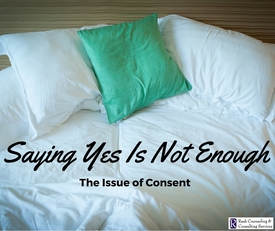 Have you had chance to talk to your teen about the definition of consent for sexual activity? If so, what did you learn? If not, what is keeping you from asking? In case you missed it, check out part one of this post to learn more: The #1 Parenting Mistake You Don't Know You're Making. When I ask teen clients about what consenting to sex means, I typically get one of two answers.
The truth is, simply saying yes to sex is not enough. Making an assumption that you know what the other person wants is definitely not enough. Keep reading to learn more about all of the aspects of giving true, informed consent to sexual activity.*
Now is the time to start talking with your teen about consent. If you don’t, who will? *This blog post is meant to be purely informational. The writer is not able to provide legal advice or instruction in anyway. Questions about specific examples will not be answered in the comments. Please contact an attorney if you have questions or concerns. Bethany Raab is a Licensed Clinical Social Worker in Denver, Colorado.
She is dedicated to helping teens and families be happy and healthy!  If you are like many parents, you are starkly aware of your imperfections when it comes to raising your children. You may have looked at this article with a combination of curiosity and dread. Rest easy. I am not here to tell you what you’re doing wrong – you don’t need that from me. What I do want to talk about is an issue many parents avoid addressing with their children. As kids grow, they become increasingly aware of their own bodies. They also pay more attention to others’ bodies and the presence of sexual images. These are cues that it is time for the “sex talk.” Some parents choose to let the school tackle sex ed. Other parents venture into this topic themselves. The longer I work with teens, it becomes more and more obvious that one specific issue is consistently left out of their sexual education, whether at home, school or both. The issue of consent. What do you think giving consent for sex entails? What do you think your teen knows about giving consent for sex? Ask them, and then come back to learn more: Saying yes to sex is not enough. Bethany Raab is a Licensed Clinical Social Worker in Denver, Colorado.
She is dedicated to helping teens and families be happy and healthy! Start writing with your teen! Directions and prompts are all included on this three page document, created just for YOU and your family! Read about the difference between diaries and journals: Journaling: Different Than a Diary Get 10 more prompts to write about with your teen: 10 Journal Prompts for Teens and Parents Scroll down to download a PDF of this great list!
Bethany Raab is a Licensed Clinical Social Worker in Denver, Colorado.
She is dedicated to helping teens and families be happy and healthy! 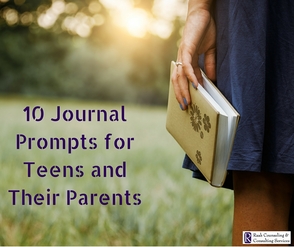 Need a new way to communicate with your teen? One of the neatest tools I have come across in my years as a teen therapist is a journal specifically made for adolescent girls and their mothers. It is a “back and forth” style book to help young women connect in a meaningful way with their mom. The thing is... not every teen girl has an involved mother, and not every mother has a teen daughter. Plus, boys and fathers are left out of this activity entirely! Below you will find ten journal prompts to share with your teenage son or daughter. These are a mix of fun/silly topics and more serious, thought-provoking prompts. First, choose a book or notebook that you will share. (You can also type documents on a computer, but give the handwritten journal a try first!) Pick a pen to keep with your journal. Agree on a safe place to leave the book for the other to read. It is important that both of you agree that what is written is private and not to be shared without the other person's permission. Okay! Now you're all set! Click below to access TEN prompts to get you writing!
Like this? Click here for a year-long set of journal prompts for teens and their parents! Want to begin writing in your own journal? Go here to get started: Journaling: Different Than a Diary Bethany Raab is a Licensed Clinical Social Worker in Denver, Colorado.
She is dedicated to helping teens and families be happy and healthy! 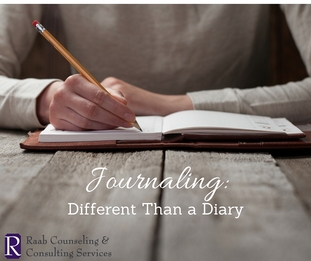 The word DIARY takes me back to my childhood. I wrote in a diary off and on for many years. Those books, pretty things adorned with cheap locks, are now gone. Still, I remember them vividly. I wrote about the day-to-day events of my life. My childhood pet, school projects, friends and the names of my crushes all found a home in my diary. My diaries were dear to me. They were carefully protected from prying eyes. Looking back, these books played a significant role in my daily and weekly routine as a child and as a teen. I wrote down events I did not want to forget. These days, I still write, though not as often as I did as a younger person. The habit of writing down daily details and special events is difficult for me to prioritize in my schedule. It simply does not happen on a regular basis. The kind of writing I do more frequently sounds similar, but it is not the same. I journal. How is journaling different than keeping a diary? Simply put, a diary is a record of events. A journal is writing with the purpose of reflection and growth. Keeping a journal is more personal and requires more vulnerability than a diary. A quick Google search will show you that journaling is not only popular, but also beneficial. It is useful as a way to help manage stress, anxiety, depression and grief. It is a tool often used in counseling to help people gain a better understanding of their struggles and their strengths. Where do I start to help my child or teen gain the benefits of journaling? Start with yourself. Get some paper, a notebook or a computer in front of you and start writing. Your experience with journaling can help inspire your teen to do the same. In the meantime, here are three prompts to get you started:
Ready for more? Check out my other posts about journaling. One includes a year's worth of journaling prompts! 10 Journal Prompts for Teens and Parents 52 Journal Prompts to Help You Connect with Your Teen This Year! Bethany Raab is a Licensed Clinical Social Worker in Denver, Colorado.
She is dedicated to helping teens and families be happy and healthy!
At their core, teens want to be heard. Give them opportunities to talk to you and be interested in who they are becoming. Be consistent in your efforts. Also, understand that sometimes they may need some space before opening up. I want to hear from you! Please share your ideas and stories about communicating with teens! Bethany Raab is a Licensed Clinical Social Worker in Denver, Colorado.
She is dedicated to helping teens and families be happy and healthy! 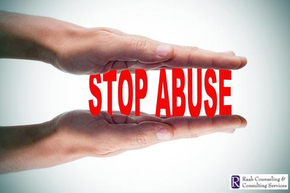 My thoughts on the Duggar family and teens who sexually abuse By now, I’m sure most of you have heard about the Duggar family and the oldest son, Josh’s inappropriate sexual behavior as a teen. I’ve been thinking a great deal about this situation and trying to reserve judgement the best I can as I am not privy to intimate details of the situation. However, I feel compelled to say a few words on the subject. For those of you who are unaware, one of my specialty areas in my therapy practice is working with teenagers who have committed sexual offenses. I have been doing this work for more than five years and have received extensive training in this area. Working with these teens is one of my great passions and an area of therapy that I truly love. I am also passionate about working with people, teens and adults alike, who have been victims of sexual abuse. Often, these two areas of practice intersect. During my nine year social work career and five years of helping teens address inappropriate sexual behaviors I’ve learned countless lessons. Here are four that stand out in light of the Duggar family situation. 1) Sexual abuse is wrong and it is illegal. Sounds obvious, but it is a point worth making. Using statements such as “kids will be kids,” “boys will be boys,” or “they were just playing doctor” is dangerous. These sentiments justify inappropriate behavior and undermine the impact sexual abuse has on its victims. 2) Keeping sexual abuse a secret is harmful to victims and the person perpetrating the abuse. Not only are both parties unable to receive help, but it perpetuates the idea that inappropriate sexual behavior is acceptable in our society. 3) Sexual acting out as a teen does not automatically make you a pedophile. A vast majority of teens I see in treatment who have sexually abused younger children are not sexually attracted to younger children. Sexual acting out by teens is driven by a number of factors including, but not limited to, experiencing sexual or physical abuse themselves, isolation, poor social skills and difficulty connecting with their peers. 4) Therapy works. The type of therapy I practice is called offense specific therapy. It has been specifically developed to help teens who have committed sexual offenses learn about why they committed their offense, help them learn healthy relationship skills and reduce their risk to sexually re-offend. Various studies show that between 87-93% of juveniles who complete this treatment successfully will NOT go on to sexually re-offend. With all of this said, I really don’t know what to tell you about the Duggar family situation. I certainly do not have enough information about what happened to insinuate that I am an expert on the situation. However, I hold firmly to my belief that sexual abuse is wrong and harmful. I also believe that both the victim and the perpetrator in any instance of sexual abuse are deserving of treatment to help them cope with what occurred. Thanks for reading! Please do not hesitate to contact me with comments or questions on this topic. I’d love to hear from you! Bethany Raab is a Licensed Clinical Social Worker in Denver, Colorado.
She is dedicated to helping teens and families be happy and healthy! 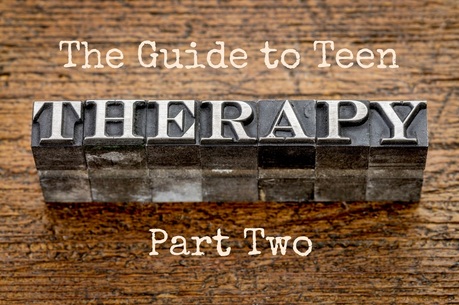 What to expect in counseling So your parents are taking you to counseling. Click here to read the first post in this series: Why is My Mom Making Me Go To Therapy. Here are a few ideas of what you can expect to talk about as you meet your therapist and get started.
When it comes to your parents, your therapist can and will share some things with your parents. It is not their place to tell all of the details about your sessions. Those are between you and your counselor. These are some of the major aspects of beginning therapy. Please ask questions if you do not understand a question, a form or what is going on. Here the first post in this series: Why is My Mom Making Me Go To Therapy. Read the third post: What's the Deal with Your Therapist? Click here to learn about what you can expect if you were to work with Bethany. Bethany Raab is a Licensed Clinical Social Worker in Denver, Colorado.
She is passionate about helping teens and families be happy and healthy! Why is my Mom is Making Me Go to Therapy? If you are reading his post, you are probably one of two types of people:
My next few posts are all about helping parents and teens understand each other’s point of view about going to counseling. Today, I answer two very common questions from teens about therapy. “Can my parents make me go to counseling?” The answer is a little tricky. Legally, it varies from state to state. In Colorado, teens who are 15 years and older MUST consent to their own therapy. Parents have to give their permission for teens who are under the age of 15 to be seen by a counselor. The age limit might be different in your state, but written permission for therapy is required everywhere. So, if you are under 15, and live in Colorado, your parents can “make” you go to therapy. They can also strongly encourage older teens to go or make it a requirement in their home. What parents cannot do, is force you to talk or make you be honest with your therapist. This is something you have to decide for yourself, regardless of your age. “Why do my parents think I need to go to therapy?” Sometimes it can help to speak with someone who is objective, meaning they aren't part of your family, your school or your community. Some of the main reasons I see teens for counseling are when they experience:
This is just a short list of the things you can talk about in therapy sessions. Nothing is off limits. If you want to talk about it, go for it! Therapists are great listeners PLUS they'll offer suggestions and work with you to meet your goals. Check back next week for a post about what you can expect when you go to therapy sessions. I'll also be posting soon about what's up with your therapist and why you just might like therapy! Update: Check out the second and third parts of the series! The Guide to Therapy for Teens, Part Two: What to Expect in Counseling The Guide to Therapy for Teens, Part Three: What's the Deal with Your Therapist? Bethany Raab is a Licensed Clinical Social Worker in Denver, Colorado.
She is passionate about helping teens and families be happy and healthy! |
Welcome!
Every blog post you see on this page is written especially for teens and their parents! Like it? Pin it!
Follow me!
Categories
All
|
||||||||||||||
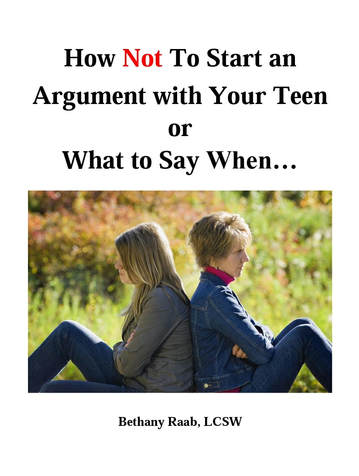

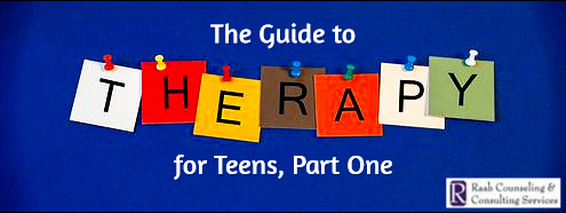

 RSS Feed
RSS Feed